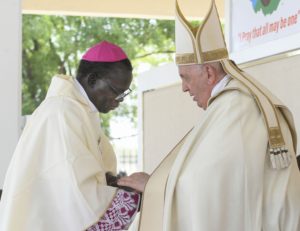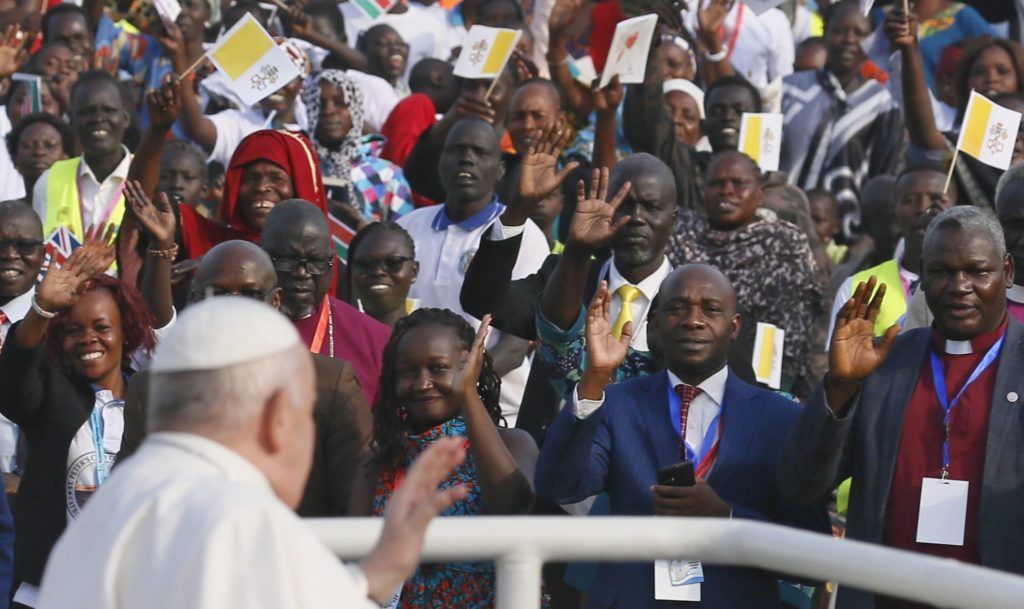ROME — In a sense, the nation of South Sudan was born on the back of the Catholic Church.
Roughly half of the country’s population of around 12 million is believed to be Catholic, President Salva Kiir is a Catholic who spearheaded the secessionist movement, and, in a country where only 1 in 4 people can read and write, immensely popular Catholic radio stations served as a critical voice for the drive that led to independence from Sudan in 2011.
Perhaps that background helps explain the enormous interest the Vatican has shown in South Sudan, and why the Church has so much invested in whether the country can survive the interlocking series of crises it presently faces.
Recently Italian Cardinal Pietro Parolin, the Vatican’s secretary of state and thus Pope Francis’ top aide, recently made his third visit to South Sudan, using the country to reject “the plague of vengeance.”
Also recently, Francis revealed that Archbishop Ameyu Mulla of Juba, the national capital, will be made a cardinal on Sept. 30. Though there are 21 new cardinals set to receive their red hats in the consistory, the fact that Francis was especially keen on Mulla is clear from the fact that he made the announcement on July 9, which is also the anniversary of South Sudan’s independence.
The gesture came on the back of the pontiff’s own trip to South Sudan last February — an outing he took in the company of Archbishop Justin Welby of Canterbury, head of the Anglican Communion, and the moderator of the General Assembly of the Church of Scotland, Rev. Iain Greenshields, representing an almost unprecedented display of ecumenical solidarity during a papal voyage.
In turn, that trip capped a papal peace offensive that also included inviting Kiir and his main rival, Vice President Riek Machar, to a retreat at the Vatican in October and November of 2019, where he knelt and kissed their feet and asked them to honor a 2018 peace agreement, which has been subject to repeated violations.
God knows, South Sudan can use whatever help the pope and his team can provide.
What started as a political spat between Kiir, an ethnic Dinka, and Machar, an ethnic Nuer, has become an intermittent cycle of brutal ethnic violence which, according to the United Nations, has left more than 400,000 people dead overall, and at least 400 just in the period between January and March of this year.
In addition, South Sudan also faces one of the world’s most severe hunger crises, with an estimated 7.8 million people projected to fall short of their food needs in 2023, meaning almost three-quarters of the country’s population, according to the World Food Programme.
Floods in late 2022 and early 2023 also affected more than 900,000 people and led to outbreaks of cholera and malaria. Such natural disasters, which some observers believe to be related to the consequences of climate change, are especially threatening in a country that lacks the infrastructure to respond effectively.

As if those problems aren’t enough, South Sudan also faces a worsening economic crisis. Oil represents 95% of all exports but production has dropped dramatically, in part due to the violence, and the country’s currency lost 60% of its value between 2021 and 2022.
According to statistics from the World Bank, South Sudan remains one of the most impoverished nations on earth, with 82% of the population living on less than $1.90 a day. Only half the population has access to safe drinking water, only half have access to health care, and only about 10% are estimated to have access to basic sanitation.
In a word, South Sudan appears to be living a nightmare. Is there any reason to believe the pope’s initiatives can make any difference?
Clearly, a pontiff does not possess a magic wand capable of making social and political problems disappear. If he did, for instance, Francis would have wielded it already to end the war in Ukraine, but instead that conflict grinds on with all its lethal intensity.
Yet the right question may not be so much whether the pope’s efforts have made the situation appreciably better, but rather how much worse things might be without them.
That’s a point that may apply in a special way to the elevation of the 59-year-old Mulla as a prince of the Church, who’s now positioned to act as perhaps the single most authoritative voice of South Sudan on the global stage — with a credibility likely exceeding that even of Kiir, who may be the official head of state but whose moral credentials are, to say the least, contested.
Truth to be told, there’s much the outside world does not understand about the Catholic Church. Yet one point everyone seems to get is that a cardinal is a big deal — and, as a result, there’s a sort of E.F. Hutton effect that comes with the office: When a cardinal talks, people listen.
Mulla didn’t get to where he is without difficulty. When he was appointed to Juba in 2019, various clergy, laity, and indigenous groups protested, objecting that he’s not from the dominant ethnic group in Juba and had only a limited command of the local language. They also claimed he had fathered six illegitimate children with two different women, although a Vatican inquest apparently cleared him of those charges.
Now, however, the pope has set him up to be the tribune of his people. That may not be a game-changer, but it’s at least something — and in a country so accustomed to nothing, having even something may well represent a slight flicker of hope.

